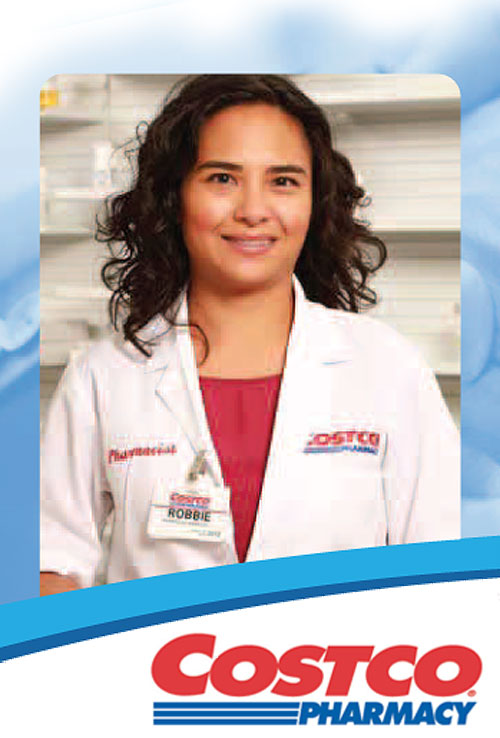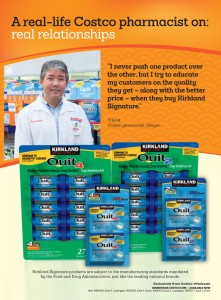Robbie Almeida, a Costco pharmacist in Ann Arbor, Michigan, finally quit smoking after 15 years of advising her customers to do the same. This is how she did it.
As a pharmacist, Robbie knew about the health benefits of vitamins and other supplements. She also knew that certain vitamins and supplements would help her quit smoking.
“I take a multivitamin. I take triglycerides. I take flaxseed oil, probiotics and CoQ10. And I take a calcium pill.”
Robbie tells her customers at Costco pharmacy that wanting to quit is the first big step. For Robbie, once she made that decision, the rest followed easily.
“Honestly, I just did it cold turkey. I remember I had my last cigarette at my friend’s house, and I was done. I stayed away from smoking areas so I wasn’t tempted or craving or anything like that. I wanted to quit, so that’s how I did it. Now if I smell cigarette smoke it makes me ill. I don’t like it at all, and I think, ‘Oh, that was really gross.’ How could I have been doing that for so long?”
Most people won’t be able to quit cold turkey like Robbie, but making that decision is an important first step.
Even when she was smoking, Robbie knew that she was harming her health. Like so many people, she started smoking as a teenager. She thought “everyone” was doing it, and it seemed so cool. Then, as a pharmacist, she had to talk to her customers about the risks of smoking and advise them to quit. It was hard to hear that smoking raises your risk of heart disease and diabetes almost every day.
“The health benefits of it all–how does it make sense to put something foreign into our systems? My kids are nine and eight. They don’t remember when I was still a smoker; it’s been over 10 years. But I tell them about it so that they won’t start like I did. I tell them that it doesn’t make any sense. You’re putting something in your body that doesn’t belong there.
“There’s disease. There’s pre-mature death. And the sooner you quit, the sooner your lungs can start to recover. Back when I was smoking, I had pleurisy in my lungs, like there was an infection in the lining. Right now I feel that my lungs are probably close to 100% healthy.”
Robbie quit soon after finishing pharmacy school. She admits that she smoked through school because of the stress. But learning about lung cancer, heart disease, strokes–she realized that it was time. She also saw what it was doing to her patients.
“We measure patients’ lung capacity, and every year or so and I have to talk to the smokers about the benefits of stopping. You can tell right away when they blow into the tube and they can’t breathe that they have had decades of smoking. It’s really bad. And then of course they have to rely on drugs, like inhalers, and everything else that goes along with smoking-related diseases, and all that is very costly. So, it doesn’t make any sense.
“I’ve had patients come to me with nicotine gum and ask me whether it works or not. I tell them that they have to be willing to quit, because if they’re not, nothing will really work. I haven’t been monitoring exactly how many patches or over-the-counter products people are buying now thanks to their New Year’s resolutions, but more people are coming to the pharmacy and talking to me about quitting.
“I believe in determination. In my mind I was done smoking, so that’s why I was able to quit. It’s up to each individual to realize the benefits of quitting and to decide how to do it. A lot of people use the gum or the patch. That’s fine. With the gum, heavy smokers can start off with a higher dosage to decrease the craving, and then gradually decrease the dose as they start smoking less. They taper down until they get to the lower dose and then, hopefully, the cravings won’t be there and they will have quit.”
Family history also plays a role. Robbie’s father smoked until she was born. Like Robbie, he stopped before his children saw him smoking. But Robbie’s grandfather smoked and great grandmother also smoked. Robbie’s grandfather died of complications from smoking; most likely, it aggravated his heart disease. Robbie has been taking calcium ever since she finished school to avoid osteoporosis. She wants to keep strong bones so that she’ll be healthy for his children
“A lot of older smokers don’t think like that. They are pretty much addicted and they can’t stop. My children are always on my mind. I have to be healthy for them, so everything that I’m doing is so that I can be with them longer.”
By Jonathan Jarashow


